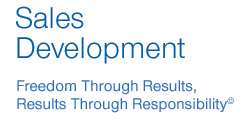Stop Kidding Yourself
March 8th, 2019
Over the last year, I have interviewed over 100 salespeople on behalf of our clients. I asked every one of them at the onset to describe their sales approach or methodology. In over 85% of cases, the candidate replied with some form of “I am a consultative salesperson!”
In light of the 93,000 articles that have recently been written about the importance of consultative selling and the enormous impact it has in today’s selling environment, I would fully expect any sales candidate that hasn’t been living in isolation to say they sell consultatively. Step One—Correct Answer!
Unfortunately, after 15 minutes of dialogue with each of these “consultative” salespeople, less than 15% of all candidates asked 3 or more questions!!! In fact, the vast majority hung up the phone without learning a thing about what I was looking for, why I was talking with them, what success looked like, my role in the hiring decision, or any other vital information. So much for being consultative…
A few quick facts…:
1. Talking about consultative selling and actually selling consultatively are two completely different things. It doesn’t matter if you can say it. It only matters if you can do it.
2. Consultative selling mandates that a salesperson ask critical, timely, tough questions.
3. It also requires pushing back and challenging when 1+1 does not equal 2, in an assertive, yet respectful, manner.
4. The VAST majority of salespeople fail here, not because the questions are difficult, but because the questions cannot be scripted in advance.
A salesperson’s questions should almost always result directly from the prospect’s most recent response. This is where the problem usually begins. If you are one of those individuals who resembles my remarks and wishes to stop fooling yourself into believing you are selling consultatively, here are several critical personal attributes necessary to begin walking your talk and selling much more effectively.
Child-like Curiosity: Consultative salespeople behave much more like children than like experts, continually challenging their own assumptions and asking their prospects to tell them more about what they are hearing. Weak salespeople rarely ask prospects to explain anything.
Sincere Interest: Don’t act sincerely interested, BE sincerely interested.
Listening: Many salespeople lack even the most primary listening skills. Listening skills can be developed, but the journey must begin by being honest with oneself. Start by asking: “Am I really listening, or simply waiting to talk?”
Unselfishness: Many people, and most salespeople, find it very difficult to focus entirely on what someone else is saying without reacting emotionally about how the words affect themselves. A ME-centered salesperson will never hear everything their prospects are really telling them.
Patience: Salespeople cannot wait to talk about what they sell and how it helps. Consequently, they avoid asking more questions for fear that doing so may delay their presentation, demo, or proposal. These weak salespeople feel better talking about how great they are because they are more confident in their ability to talk, present, and pitch than in their ability to ask, listen, and learn. This dysfunctional cycle actually moves them backwards instead of forward. Effective salespeople slow down and go much deeper and wider with their discovery and investigations. Believe it or not, this actually saves them time.
MORE Patience: - Part of the reason that most of the candidates told me they are selling consultatively is that they actually believe it! They believe they are selling consultatively when they have asked a few questions. Unfortunately for them, they aren’t even scratching the surface until they’ve asked 3 to 4 dozen of them. And these are NOT scripted questions, rehearsed or recited from a list. We are talking here about 40 or 50 spontaneous, inquisitive, thought-provoking follow-up questions to one, or perhaps two opening questions the salesperson asked during the first few minutes.
You’ll notice that each of the items I’ve listed here are foundational qualities of mindset, choice and attitude, versus manipulative tactics or techniques. Each item can be developed and dramatically improved via an honest self-assessment, a commitment, and some recurrent practice. You can quickly accelerate your development by associating with a coach and peer group.
Enjoy the Journey…
Copyright © Joe Zente 2019. All Rights Reserved.









